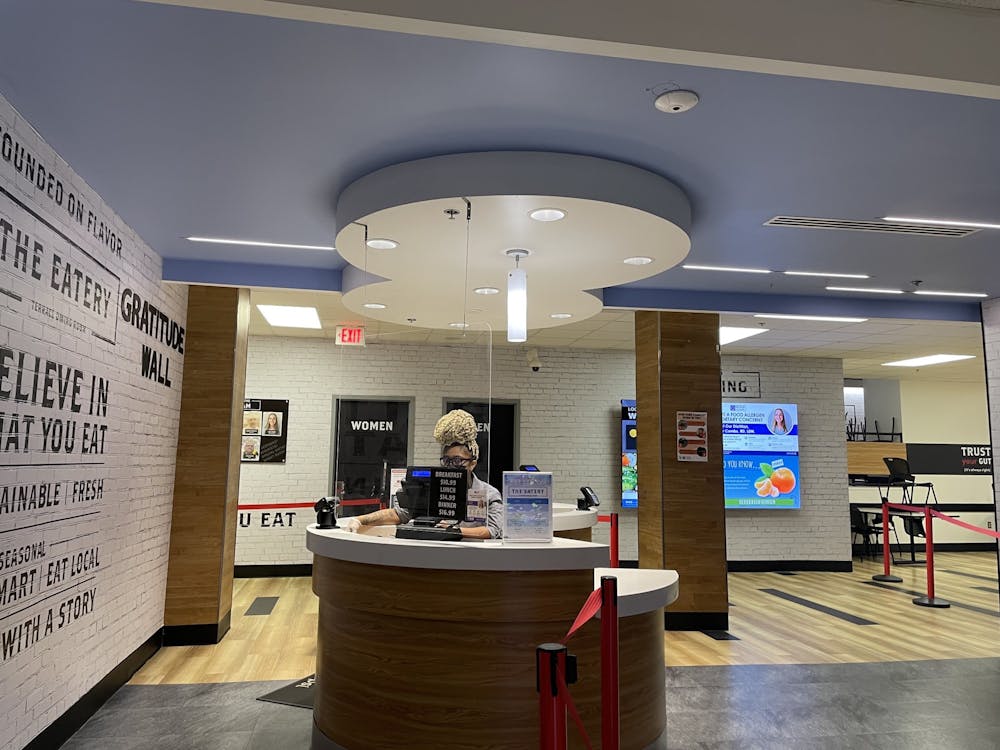American University’s Dining Advisory Committee held its first meeting of the semester Feb. 3 in TDR to hear student feedback on ways to improve campus dining services.
The committee, which included TDR administration and employees, answered questions from the audience regarding meal plans, dietary restrictions and changes to menu options.
Some students voiced concerns about the lack of accommodations for people whose food choices are limited by diet, allergies or religious reasons. Katherine Greenstein, president of the AU Disabled Student Union and sophomore in the School of Public Affairs, expressed their interest in seeing dining options become more inclusive.
“People who have dietary restrictions, allergies, auto-immune diseases should still have the right to make dietary choices for themselves,” Greenstein said after the meeting. “So finding a way to make that work for people is one of my biggest concerns in terms of general dining.”
The Centers for Disease Control and Prevention reports that about 17 percent of U.S. adults aged 20 and over had some kind of dietary restriction between 2015 and 2018. On the AU Dining website, students with special accommodations are encouraged to visit the Office of Student Disabilities to discuss special requests or services outside of the currently offered program.
Greenstein added that work should be done to ensure that students with dietary restrictions should have access to food that they not only can eat but also enjoy. They also recommended that TDR work to make “allergen-free” options more available to students.
“Making sure that people with dietary restrictions have an extra amount of choice is important,” they said. “It’s not just that we need an option — we need lots of options, the same as everyone else.”
The committee also discussed its initiative to reduce food waste through several methods like trayless dining, which AU Kitchen says has saved 900 gallons of water per day, and utilizing FarmShelf, a “smart, automated vertical farm” with custom LED lights that uses 90 percent less water than traditional farming to make fresh produce for meals.
As “a leader in sustainability,” according to the AU Kitchen website, the dining hall also practices recycling, hydration stations and Save a Swipe, an initiative that allows students to donate five meals from their meal plan to help other students in need.
In response to inquiries about expanding meal exchanges, committee members said that the food offered at on-campus dining facilities is determined by the supply-chain relationship with the vendor. They explained that issues with these supply chains are what normally cause changes to meal exchange policy, such as when Subway’s footlong sub was reduced to a six-inch in October.
SPA freshman Melanie Klein said that “having clear communication” with students and offering healthier choices are goals that TDR could improve upon.
“For example, showing the menu before you walk in so you can see what’s available or having a strong variation between prepared meals and things that you can customize are very important to students,” Klein said. “Also just integrating more produce and healthy options into students’ meals are great ideas.”
To help facilitate the communication between administration and students, Klein suggested creating a feedback system where users can rate their experience and post comments about dining services.
“Letting them know what meals to include more often would be helpful,” she said.
Students who want to give feedback about their experiences at any AU dining location can currently post their comments in the Help & Services section of the AU website.





